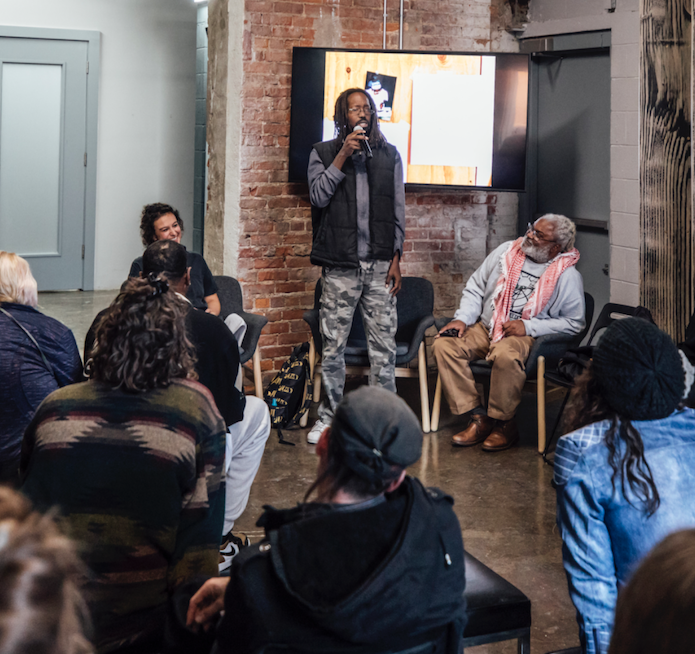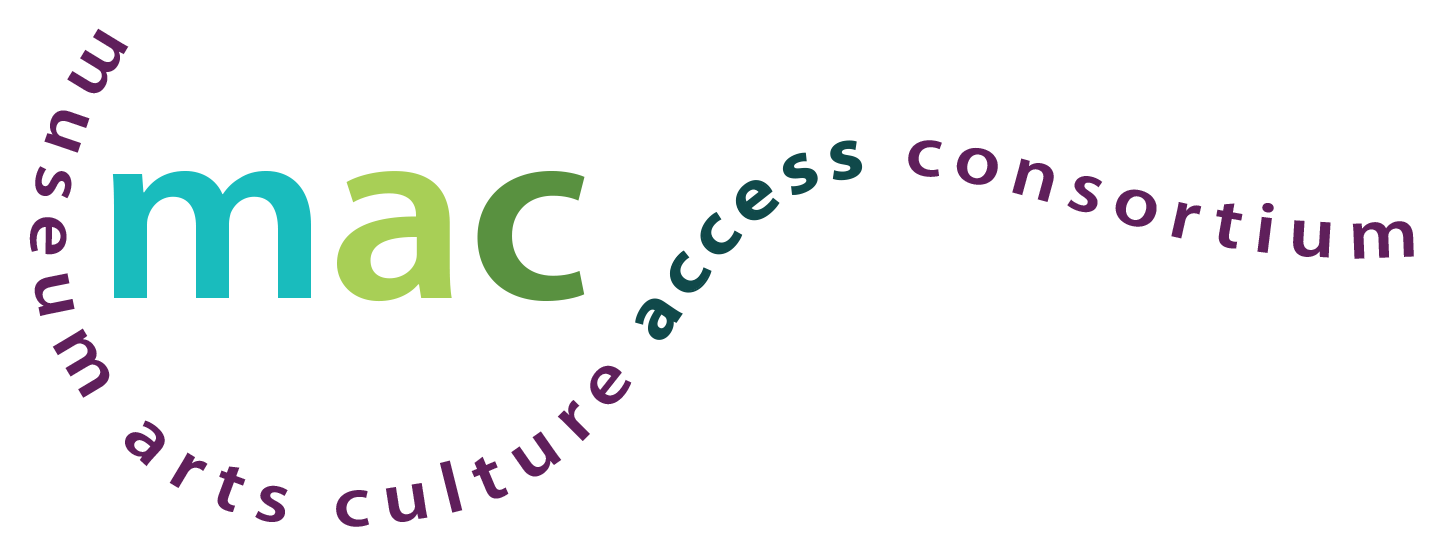
- This event has passed.
Access Intimacy in the Arts: A Conversation with Ezra Benus, Taraneh Fazeli, and Owólabi Aboyade
May 27, 2021 @ 5:00 pm - 7:00 pm
Free
Co-presented by Center for Curatorial Studies, Bard College and Abrons Arts Center. Co-organized by Krista Alba, Natasha Matteson, Bernardo Mosqueira, Georgie Payne, Allie / A.L. Rickard, and Candice Strongwater.
How can we nurture and create access intimacy in the arts?
Join MC and organizer Owólabi Aboyade, artist and curator Ezra Benus, and curator Taraneh Fazeli for a conversation on art, music, curatorial practices, and accessibility in the arts. Their conversation takes root from disability justice activist Mia Mingus’s concept of access intimacy: “…that elusive, hard to describe feeling when someone else ‘gets’ your access needs. The kind of eerie comfort that your disabled self feels with someone on a purely access level.” In addition to discussing how access intimacy can be nurtured and created in the arts, they will question who can, should, and must participate in this process. The participants have collaborated on past projects including Taraneh Fazeli’s exhibition Sick Time, Sleepy Time, Crip Time: Against Capitalism’s Temporal Bullying and bring their shared experiences and ongoing relationships to the conversation.
Register for this free program: https://ci.ovationtix.com/209/performance/10679306?performanceId=10679306
This conversation is being held in English with ASL (American Sign Language) and English real-time captioning (CART). A participation guide will be shared with all registered attendees that includes information on accessibility for the program. For additional access requests, please email audienceservices@henrystreet.org.
This program grew out of Access as Creative Methodology, a practice-based course organized by Cori Olinghouse in collaboration with artist Jordan Lord and Abrons Director of Programming Ali Rosa-Salas, and a cohort of CCS Bard ‘21 graduate students. Considering the ways in which access shapes the ground of practices of curating, gathering, and living, this initiative asks how our work fundamentally changes when we start with access, rather than treating it as an afterthought. Likewise, the group has focused on the ways in which many disabled artists utilize access to interfere with existing structures, standards, and status quos.
Taraneh Fazeli is an Iranian-American curator, writer, and educator living between Waawiiatanong/Detroit and Lenapehoking/Brooklyn. In 2016, after a decade working at NYC-based arts organizations such as Artforum, e-flux, Triple Canopy, and The New Museum, she became an independent curator. She teaches at the Center for Creative Studies (Detroit, Michigan), lectures widely, and has written for publications including Artforum, Art in America, Hyperallergic, and Flash Art.
Her recent exhibitions include “Sick Time, Sleepy Time, Crip Time: Against Capitalism’s Temporal Bullying (2017-20) on the politics of health, disability, and care and “I let them in. Conditional Hospitality and the Stranger.” (2018) which used hospitality as a lens to understand the limits of empathy and effects of “white benevolence.”
Taraneh’s curatorial practice engages art as a site to constitute reparative cultural rituals and publics, interrogate the techniques of representation, and dream more-just ways of being together. She roots her approach to curating at the intersection of the disability and diasporic communities she calls home. She is co-director of Poetic Societies, a Detroit-based non-profit organization that uses arts and healing technologies to focus on transnational celebratory cultural events to help participants regain ancestral knowledge lost due to migration, forced displacement, processes of enslavement, or colonization. Taraneh co-founded Relentless Bodies, a Detroit-based creative disability and healing justice collective, is a Detroit Equity Action Lab fellow, and advises on accessibility committees for organizations such as Allied Media.
Ezra Benus is an artist, educator, and curator whose work addresses a range of themes in his art such as constructions of time, care, pain, and illness/health. Their self is a site where social, political, and spiritual forces collide through reflections on bodily knowledge and social constructions around values of normativity. Ezra’s practice is cradled by embedded Jewishness, queerness, and sickness as purviews and navigational tools in this world. Their practice and projects have been hosted by The 8th Floor, Flux Factory, NYU Gallatin Galleries, Dedalus Foundation, Gibney Dance, The Laurie M. Tisch Gallery at the JCC Manhattan. Ezra has lectured and consulted at universities and art spaces such as Red Bull Arts in Detroit, Hunter College Art Galleries, Eyebeam, SUNY Purchase, CUE Art Foundation, York College, and Princeton University, and UT Austin. Benus was an Erich Fromm Fellow at Paideia Institute in Stockholm and the first Access and Adult Learning Fellow in the education department at the Brooklyn Museum. He is currently a 2020-2021 SHIFT Artist in Residence at EFA Project Space, and works at United States Artists as Program Manager of the Disability Futures Fellowship, along with dedication to educational and curatorial projects. Ezra and Noah Benus founded Brothers Sick, a sibling artistic collaboration on disability justice, illness, and relationships of care. The Shed recently commissioned their Up Close digital artwork Phases and the In-Betweens with collaborators Yo-Yo Lin and Danilo Machado. Ezra is sick, tired, and forever grateful to be building community with disabled and sick artists around the world.
Owólabi Aboyade (William Copeland) is a father, an MC, writer, editor, climate justice organizer, and decolonizing facilitator from Detroit. He makes hip hop anthems, articles, zines, community care circles, and cultural exchanges that explore what liberation can look, feel, and sound like.
As an MC, stage name Will See, and as a member of the Long Hairz Collective, Owólabi creates music and poetry that supports social transformation. In addition to conventional touring, he has shared his work at schools, prisons, conferences, rallies, and political gatherings. Owólabi founded Collective Wisdom Detroit to support local hip hop culture creators and organize entertainment justice events locally, nationwide, and internationally.
As a writer, Owólabi shares his political analysis, creative nonfiction, poems, and short stories in various publications, including Geez Magazine, the Audubon Magazine, Hood Communist, and more. He is also the co-creator of Bullet*Train, a digital zine chronicling Detroit’s revolutionary culture in 2020.
Navigating kidney failure since 1990, an acute health crisis in 2017 led him to organize around disability justice and community care. He co-founded and facilitates “Relentless Bodies,” a Detroit-based creative disability and healing justice collective.
In 2021, Owólabi was selected as an inaugural Radical Imagination Fund fellow for advancing racial justice in Detroit through arts and culture. He continues to dynamically share the liberation lessons of Detroit, and to create environments of justice and healing that are immersive, healing, generative.
The Graduate Program at Center for Curatorial Studies (CCS), Bard College is an intensive course of study in the history of contemporary art, the institutions and practices of exhibition-making, and the theory and criticism of contemporary art. It is uniquely positioned within the larger Center’s tripartite resources, which include the CCS Bard Library and Archives and the Hessel Museum of Art, with its expansive permanent collection. https://ccs.bard.edu/
